Sword-Wielding Women of Chinese Cinema:
Chia Ling
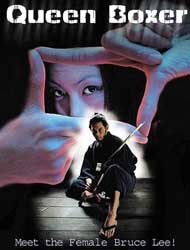 Chia Ling (aka Ga Ling, Ka Ling, or Cha Ling -- by whatever name, at the box office she was ka-ching) will always be saddled outside of Asia with the promotional name "Judy Lee." Chia Ling (aka Ga Ling, Ka Ling, or Cha Ling -- by whatever name, at the box office she was ka-ching) will always be saddled outside of Asia with the promotional name "Judy Lee."
Her official first film was Queen Boxer (Chou, 1972) which has also been distributed as Fearless Karate Girl, Kung-fu Queen, Brutal Revenge & as literal translated The Avenger).
Queen Boxer was shot in a scant eleven days (eleven days depending on who's reporting) by a woman director eager to cash in quickly on the world-wide popularity of Bruce Lee.
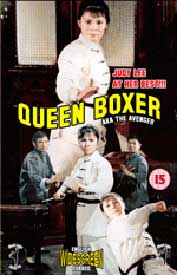 It was the film studio who renamed her Judy Lee & pretended she was Bruce Lee's actual sister. He did have sisters who weren't involved in cinema, yet the world briefly believed she was one of them. It was the film studio who renamed her Judy Lee & pretended she was Bruce Lee's actual sister. He did have sisters who weren't involved in cinema, yet the world briefly believed she was one of them.
The young actresses of the day were "kept" or "protected" in almost monastic conditions, kept busy studying acting, martial arts, learning lines, & rushed from one production to the next not permitted personal lives. They were by no means pampered or permitted to act like divas as today's stars so often are.
Chia Ling could not have vetoed the pretense even if she'd been informed of the promotional scam in advance. And I wouldn't even want to swear the independent film company made such a promotion on purpose except by intentionally inducing fan gossip by the choice of name, & then keep mum when the fans decided for themselves she was Bruce Lee's sister.
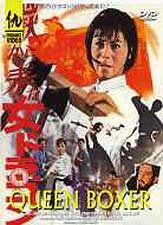 She nevertheless accepted responsibility with humbled grace when the alleged relationship eventually got her in some trouble with a duped public in Taiwan & Hong Kong. She nevertheless accepted responsibility with humbled grace when the alleged relationship eventually got her in some trouble with a duped public in Taiwan & Hong Kong.
Though I doubt it's the cause, some still believe the fraud is why she soon faded from public notice in the west, whereas Angela Mao & Nora Miao retained continuing interest for action filmgoers. Personlly I think it is just that the 1970s fad for kung fu films was on a downhill ride after Bruce Lee's death & it was merely less & less a commercial winner for American companies to keep buying rights to new films. In Asia Chia Ling's apology was thought sufficient, & she continued to be a huge box-office draw long into the 1980s.
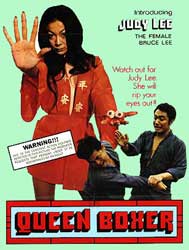 In that first film Queen Boxer, when she was only eighteen years old, Ling in the role of Su Chen shows her stuff with empty-hand & as knife fighter, out to save her family from the most abominable bad Axe Gang of Shanghai. In that first film Queen Boxer, when she was only eighteen years old, Ling in the role of Su Chen shows her stuff with empty-hand & as knife fighter, out to save her family from the most abominable bad Axe Gang of Shanghai.
Available so far as I can ascertain dubbed in English, transferred from an obviously worn out copy, it's hard to believe the dialogue could've been this ridiculous in Mandarin. One old vhs box advertises her as "the most deadly of ninjas" using that year's popular theme to promote a film that has no ninjas in it.
One has to be in the mood for violent exploitation without too much concern for quality, beyond the quality of a beautiful young woman's physical motion in kicking ass.
Ho Meng Hung's fight choreography merits some praise whether or not much else does. There's most assuredly no shortage of battle action for our beautiful heroine. "It is what it is" & the final reel is non-stop punching & kicking & blocking featuring most especially the two-knife style of the heroine. So Queen Boxer delivers this one thing adequately.
Almost certainly director Florence Yu Fung-chi (Yu Feng Zhi), a minor actress of the 1960s, hoped this film would launch her own writer/director career. Alas, she seems not to have done much, not that the cheaper end of Taiwan film releases are well documented in English. Queen Boxer would remain Yu Fung-chi's only widely remembered directorial effort.
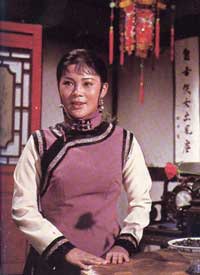 As women were not encouraged at the high end of filmmaking except as actors or producers, it's not surprising she was part owner (with Peter Yang Kwan) of the production company that made Queen Boxer, as well as the anthology horror film Blood Reincarnation (Yingyang jie, 1974), & so on. As women were not encouraged at the high end of filmmaking except as actors or producers, it's not surprising she was part owner (with Peter Yang Kwan) of the production company that made Queen Boxer, as well as the anthology horror film Blood Reincarnation (Yingyang jie, 1974), & so on.
Florence's own directing credits include Disco Fever (1979) which she also produced, starring Candy Yu & James Wong; First Time (Di yi ci, 1983) with Leslie Chung & Peter Yang Kwan; & Morning Goodbye (1973) which she also wrote, starring Peter Yang Kwan.
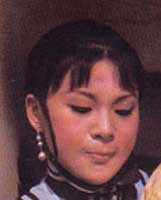 Along with Peter Yang Kwan she co-directed Chia Ling in The Escape (Ren, 1972). Peter Yang Kwan is said to have discovered the young actress for this film. Along with Peter Yang Kwan she co-directed Chia Ling in The Escape (Ren, 1972). Peter Yang Kwan is said to have discovered the young actress for this film.
Although Queen Boxer is officially her first film, dates for these independently & hastily produced Taiwan movies are impossible to peg down, & likely The Escape predates Queen Boxer by a couple of months.
When last I checked, The Escape was available only from the "grey" market with very fuzzy subtitles of a later generation transfer. We can keep our fingers crossed that some company eventually does a remastered restored release with optional subtitles, but I'm not holding my breath. For now, the grey market has to be the source.
Chia Ling received Taiwan's Golden Horse Award for Best Actress for this performance, which ought to be reason enough to ferret this one out. Frequently the rights to these independent productions are lost in a string of bankruptcies & sales, or the whereabouts of the original negative unrecorded, so who knows if this one will ever have a really proper restoration.
She plays acrobatically skillful opera star, Hsiao Yu, whose training on the stage has prepared her for actual fighting. The government wants her to spy on a general, played by co-director Yang Kwan, whereas the General wants the skillful young woman to support his agenda. Since Chia Ling in real life had herself been trained startomg frp, childhood in the highly acrobatic Chinese opera, this role was tailor-made just for her.
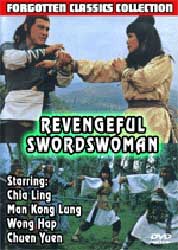 I began watching another dvd from Tai Seng's Martial Arts Theater, only to find once again that the scope cinematography is cropped for full screen, on all four sides rather than just the right & left. I began watching another dvd from Tai Seng's Martial Arts Theater, only to find once again that the scope cinematography is cropped for full screen, on all four sides rather than just the right & left.
Plus it's dubbed with voices that sound like the staff of the Hanna-Barbera cartoon factory, one of the amateur voice-actors doing a London Street urchin fresh from the set of some high school version of the musical Oliver, another clearly wishing he was dubbing Sergio Leone & doing a standard Old Coot western voice as if to say there's gold in them thar hills.
I immediately stopped watching this 25-years-old worn out faded ruinous transfer & checked to see if I couldn't get the film in a more reasonable state. I used to settle for this kind of copy a lot, but in the modern dvd age when companies like Celestial are issuing well over one-hundred remastered classics each year, it gets harder & harder to settle for transfers from destroyed old prints or later generation pirates.
But, well, I couldn't find it available in a jiffy, so I decided to settle after all, & tried to forgive the limitations the format imposed on The Revengeful Swordswoman (Yi dai tian jiao, 1979).
Athletic & very beautiful Chia Ling plays Hsiang Ying the Heartless Lady (in the dub she's called Sha Chin). She's in full action right out of the gate as her sifu (ably played by Hsieh Wang despite bad dubbing that spoils his line deliveries) angrily tosses her from a very high cliff. Instead of being crushed by the fall, she leaps up to fight a pack of wolves.
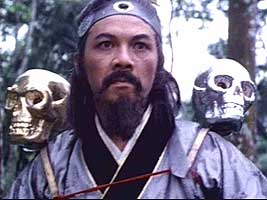 A scene seems to have been lost, for we don't get to see the wolf fight, & we jump to the last seconds of how she crawled back up the mountain to her sifu's hut begging him not to cast her out with such vicious disregard for her life or emotions. In reply to her tearfulness, he beats her unconscious & she wakes up in a cage, in which she is fed slop. So now she's really mad. A scene seems to have been lost, for we don't get to see the wolf fight, & we jump to the last seconds of how she crawled back up the mountain to her sifu's hut begging him not to cast her out with such vicious disregard for her life or emotions. In reply to her tearfulness, he beats her unconscious & she wakes up in a cage, in which she is fed slop. So now she's really mad.
There's something Zen in all this of course, but thank the gods, the film doesn't try to elaborate on that.
Handsome young swordsman Ku Chun (Man Kong Lung, star of a number of ultra cheap chop-sockies from Taiwan, the majority poorly preserved today) happens by & offers to help. She angrilly informs him "I'm not asking for help!"
He lets her out of the cage despite her protestations & sticks around long enough to help her kill her sifu. Too late does she realize her sifu's pose as her enemy was her final lesson before unleashing her to her destiny.
On his dying breath her sifu informs her he had been a friend & colleague of her father, who was killed when she was a little girl. He spent these years training her to become a great martial artist, & then reveals to her how a certain General Ku had her father slain out of treachery.
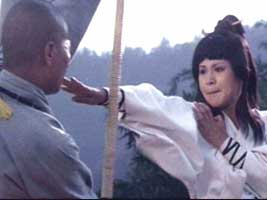 Though called The Revengeful Swordswoman her action scenes are mostly legwork & empty hand, with just a token bit of swordplay on her part, though many of her enemies are fully armed.
Though called The Revengeful Swordswoman her action scenes are mostly legwork & empty hand, with just a token bit of swordplay on her part, though many of her enemies are fully armed.
The rarely used alternate title Flying Masters of Kung Fu is only slightly more descriptive; there's not that much "flying" or wire-fu work except toward the end, & the larger percentage of fight sequences, which are numerous, attempt to be semi-realistic rather than lots of flying & exploding stuff from a distance with chi energy & all the usual cliches that make the genre on average pretty silly. I prefer the down-to-earth swordplay & fight action & would probably have enjoyed this film a great deal had it been in restored condition & not dubbed.
Another swordswoman, by the name Golden Bird, is played by the great & lovely Angela Mao, who'd been in the same opera classes with Chia Ling when they were school girls, & they remained friends.
Golden Bird makes a brief appearance as an apparent avenger, though why she kills the entire Nankoon clan of a hundred is not revealed. The name Golden Bird intends to invoke the superb Cheng Pei-pei character of Golden Swallow from Come Drink with Me (Da zyu zi, 1966) though it makes for a pitiful comparison.
Golden Bird & Hsing Ying have quite a good girl-on-girl boxing sequence, with some needless fireworks thrown in. Both actresses are excellent at this sort of thing. When it's a draw (or when Hsing Ying gets unexpected assistance from young Ku Chun), Golden Bird leaps to a rooftop & promises they'll meet again. "Count on it!"
I did count on it, but they never meet again.
Our Heartless Lady has been mistakenly assumed to be one & the same with Golden Bird by a series of avengers who keep the action quotient high while our revengeful swordswoman makes her way toward the palace of General Ku.
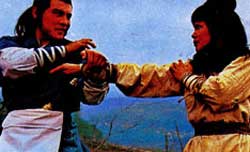 The film is mainly about walking somewhere, having a fight, then walking somewhere else, & having a fight. There are a few interesting characters along the way, opponents for Hsiang Ying who for the most part keep mistaking her for Golden Bird & are themselves of chivalrous character, but others serve Lord Ku who knows she's on the way.
The film is mainly about walking somewhere, having a fight, then walking somewhere else, & having a fight. There are a few interesting characters along the way, opponents for Hsiang Ying who for the most part keep mistaking her for Golden Bird & are themselves of chivalrous character, but others serve Lord Ku who knows she's on the way.
She never tries to explain she's not the enemy of the Nanking clan, but just has her duels one after another. Among her fights is one with a pole- & flail-fighting Buddhist monk (Cheng Sai-gang) who is dubbed to sound like a bad Walter Brennan impersonator. There's a noble swordsman who talkes like Foghorn Leghorn, & a knife-spinning fighter borrowed from Magic Blade (Tien ya ming yueh dao, 1976) who loses his right hand.
Phillip Ko Fei puts in a brief appearance imitating Jimmy Wang Yu as the one-armed swordsman. "How'd you like me to break your good arm?" asks the Heartless Lady. She pretends never to notice the elbow of his "missing" arm keeps poking a point under his loose blouse.
She is not usually seen carrying a sword but there's alwyas one nearby when her empty-hand style isn't enough to fight off well-armed opponents. When she finally reaches the palace of Lord Ku, we're told the sword she rarely had along the road is called the Golden Sword, & it belonged to her father, so she'll use it to avenge her father's killer.
I just wasn't up for running the film backward to see if I missed where she got her father's sword. Often films like this have gaping plot holes even in the original language, & more of them when the authors for the dubbing start mucking with a story.
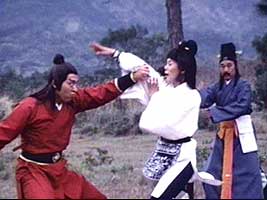 In the final confrontation we discover that Lord Ku & General Ku are not the same person, but father & son. Lord Ku (Chuen Yuen) is some sort of illusionist so that Fantasy-fu intrudes a bit at this point.
In the final confrontation we discover that Lord Ku & General Ku are not the same person, but father & son. Lord Ku (Chuen Yuen) is some sort of illusionist so that Fantasy-fu intrudes a bit at this point.
His goofiest weapon consists of Grateful Dead silver skulls mounted on his shoulders, which fly about at his command & do nothing in particular. Then there's the shockingly abused General Ku (Wong Hap) eager for the Heartless Lady to put him out of his misery.
There are a couple plot twists that aren't all that ineffective, with a dose of humanity thrown in rather than straight-for-the-nuts vengeance, & a very surprising switcheroo as to who is her real foe & who is still about to help her out.
I just checked a handful of others' reviews of this film & it tends to get one star or savage commentary of annoyance & dislike. It's true no one can deny it's unoriginal even apart from the crummy condition of the transfer.
Yet I think it's actually better than given credit for being. There's just no question but that Chia Ling is a great physical performer. Her costume design is a good one, & her character is never undermined by simpering love interest or other sentimentality, though she does now & then prove she's not Heartless after all.
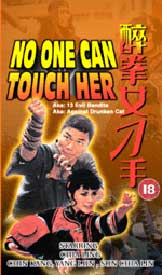 Still, in the final analysis, the so-called "pan & scan" doesn't pan out. By chopping off both sides of the screen, we are sometimes treated to an almost empty screen with an ear & an eye close up on the right, & a swordpoint on the left. It's not surprising something like that gets dumped on by disappointed fans. Still, in the final analysis, the so-called "pan & scan" doesn't pan out. By chopping off both sides of the screen, we are sometimes treated to an almost empty screen with an ear & an eye close up on the right, & a swordpoint on the left. It's not surprising something like that gets dumped on by disappointed fans.
One of Chia Ling's better starring vehicles from Taiwan is No One Can Touch Her (Zui quan nu diao shou, 1982). It has been distributed under the alternate titles Against the Drunken Cat Paws, 13 Evil Bandits, & Flying Claw Fights Fifteen Demons.
In No One Can Touch Her Chia Ling exhibits the startling ability to perform two different swordstyles simultaneously, one with her left hand & another style with her right!
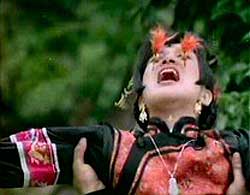 Her choreography is fascinating with or without swords. "Drunken" style boxing for which Jackie Chan became so famous is rarely done by women in kung fu cinema, but Ling Chia has developed a credible "drunken blind girl" boxing method that is great to observe. Her choreography is fascinating with or without swords. "Drunken" style boxing for which Jackie Chan became so famous is rarely done by women in kung fu cinema, but Ling Chia has developed a credible "drunken blind girl" boxing method that is great to observe.
Though the film does fall into campiness & confusing convolutions of plot, Ling Chia is never anything but mesmerizing.
No One Can Touch Her is a great movie for "realistic" martial arts (comparatively speaking) as it relies on real fight & swordfight choreography rather than wire-fu flying & reverse-reel jumping backward to the top of temples.
.
Chia Ling is simply a physical wonder in motion. Rather than a traditional scrawny beauty, she has a comparatively stocky powerfulness, & requires much less suspension of disbelief to imagine she really could win battles like these.
copyright © by Paghat the Ratgirl
|
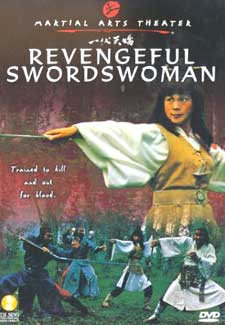

 It was the film studio who renamed her Judy Lee & pretended she was Bruce Lee's actual sister. He did have sisters who weren't involved in cinema, yet the world briefly believed she was one of them.
It was the film studio who renamed her Judy Lee & pretended she was Bruce Lee's actual sister. He did have sisters who weren't involved in cinema, yet the world briefly believed she was one of them. She nevertheless accepted responsibility with humbled grace when the alleged relationship eventually got her in some trouble with a duped public in Taiwan & Hong Kong.
She nevertheless accepted responsibility with humbled grace when the alleged relationship eventually got her in some trouble with a duped public in Taiwan & Hong Kong.
 As women were not encouraged at the high end of filmmaking except as actors or producers, it's not surprising she was part owner (with Peter Yang Kwan) of the production company that made Queen Boxer, as well as the anthology horror film Blood Reincarnation (Yingyang jie, 1974), & so on.
As women were not encouraged at the high end of filmmaking except as actors or producers, it's not surprising she was part owner (with Peter Yang Kwan) of the production company that made Queen Boxer, as well as the anthology horror film Blood Reincarnation (Yingyang jie, 1974), & so on. Along with Peter Yang Kwan she co-directed Chia Ling in The Escape (Ren, 1972). Peter Yang Kwan is said to have discovered the young actress for this film.
Along with Peter Yang Kwan she co-directed Chia Ling in The Escape (Ren, 1972). Peter Yang Kwan is said to have discovered the young actress for this film.




 Still, in the final analysis, the so-called "pan & scan" doesn't pan out. By chopping off both sides of the screen, we are sometimes treated to an almost empty screen with an ear & an eye close up on the right, & a swordpoint on the left. It's not surprising something like that gets dumped on by disappointed fans.
Still, in the final analysis, the so-called "pan & scan" doesn't pan out. By chopping off both sides of the screen, we are sometimes treated to an almost empty screen with an ear & an eye close up on the right, & a swordpoint on the left. It's not surprising something like that gets dumped on by disappointed fans. Her choreography is fascinating with or without swords. "Drunken" style boxing for which Jackie Chan became so famous is rarely done by women in kung fu cinema, but Ling Chia has developed a credible "drunken blind girl" boxing method that is great to observe.
Her choreography is fascinating with or without swords. "Drunken" style boxing for which Jackie Chan became so famous is rarely done by women in kung fu cinema, but Ling Chia has developed a credible "drunken blind girl" boxing method that is great to observe.